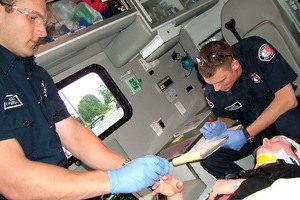Although the chance of emergency crews responding to a patient who has been infected with the Ebola virus is remote, East Pierce Fire and Rescue is preparing for that possibility. “We are working on multiple fronts to ensure that the department is as well-prepared as it can be for a response to potential Ebola-infected patients. Our goal is to provide effective and compassionate patient care, while effectively protecting our workforce and the public,” said East Pierce Fire Chief Jerry E. Thorson.
The need for emergency crews to be prepared is frequently overlooked by national and state planners. The reality is that those who are ill often arrive at the hospital in an ambulance, requiring that fire departments and private ambulance companies also plan for the possibility that they will come in contact with an Ebola-infected patient.
“The more we investigated our response, the more we realized that this situation calls for a regional effort,” said Assistant Chief Russ McCallion, who heads the EMS Division at East Pierce. “The complexity of dealing with Ebola, magnified by public fear, requires that we address the issue at the county and regional level.”
As a result, East Pierce Fire and Rescue is actively participating in county-wide meetings to address specific proposals. One such proposal the group is considering is to deploy a single, specially-equipped county-wide “Ebola” medic unit staffed by specially-trained and equipped personnel from multiple fire/EMS agencies.
Other changes can be implemented immediately. Guidelines for 911 dispatch will be updated to include additional questions about patient symptoms and travel to West Africa, or contact with others. “This will help the dispatchers to alert the EMS crews that they could be responding to a possible Ebola patient,” McCallion said.
Locally, East Pierce Fire and Rescue will continue to prepare its crews to protect them and their families based on the Center for Disease Control’s (CDC) new recommendations. The fire district is updating its training program for donning and doffing personal protective equipment—such as masks, face shields, gowns, gloves—including hands-on practice sessions. “We will also review special assessment, treatment and destination guidelines and emphasize techniques to minimize risk for our responders,” McCallion said.
Training is especially important to prevent contamination. He notes that none of the staff at the Emory and Nebraska hospitals, each of whom have long-established, well-trained, specialized infection-control teams, became infected compared to Texas, in which the hospital was not as prepared to care for an Ebola patient.
Finalizing hospital destination decisions is also critical. Currently, local hospital systems have stated that they will accept possible Ebola patients, and then transfer them later to Harborview where they will ultimately be treated. “We believe that potential Ebola patients should be transported directly to Harborview,” McCallion said.
McCallion notes that not all fire departments will be able to implement this type of a multi-tiered response. “Individual departments will struggle whether due to personnel resources or budget restraints,” he said. “We are fortunate to be large enough to quickly and effectively respond to this type of atypical circumstance.”
According to Thorson, the planning and training they are undergoing will be valuable, whether or not the firefighters ever respond to a call for an Ebola-infected patient. “This preparation will allow us to provide a safe, effective response for the next crisis—whether it is epidemic H1N1 flu, a new Avian Influenza, a SARS-type outbreak, or some unknown catastrophe,” he said.
In the meantime, McCallion recommends that the public take precautions to protect themselves from the more common threat of the seasonal flu. “So far, one person in the U.S. has died of Ebola, while flu-related complications kill thousands of Americans every season,” he said. According to the CDC, getting vaccinated against the flu is a crucial step in avoiding the disease. Older persons should consider pneumonia vaccinations. As always, proper hygiene is one of the best defenses against getting sick.
“Washing your hands frequently is probably the most important way to protect yourself. To help to protect others in the community, stay home when you’re sick. You should be without a fever for 24-hours before returning to work or school,” he said.



